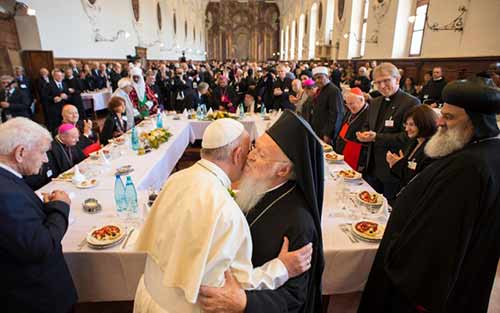
The Joint Commission for Theological Dialogue between the Orthodox Church and the Catholic Church announced that it had reached substantial agreement on the questions of primacy and synodality in the Church. It was described as a “landmark agreement”.
There is increasing acceptance of the first-among-equals of the Bishop of Rome role in the pre-1054 church. This new document is a landmark in that it is beginning to agree to a shared reading of history. This now gives episcopally-led churches a common foundation on which to stand. To be fair, the reading of history is closer to what Orthodoxy has consistently said it has been… The increasing role of the Bishop of Rome (beyond first-among-equals) was a Western, mostly-post-4th-Century development that did not follow that particular trajectory in the East. The Bishops of Rome, for example, were not even present in the first councils. The kind of authority now exercised by the Pope was simply not present in the early church.
The document still needs to be ratified by Roman Catholic authorities – but after that, it would become the official, agreed position. If that is the case, it would formally be the end of the overly-simplistic RC apologetics in which it is “the one true church” and Eastern Orthodoxy, for example, “broke away in 1054”.
Other churches (beyond RC & Orthodoxy) with episcopally-led governance should read, mark, learn, and inwardly digest this text. Those churches not episcopally led could also reflect on the first millennium of our Christian history and what it might teach us for the future.
The English Text
The Greek Text
The German Text
Good Catholic Herald article
Good Russian Orthodox article
If you appreciated this post, do remember to like the liturgy facebook page, use the RSS feed, and sign up for a not-very-often email, …



Thank you posting this Bosco; a very encouraging development. There is a delicate balance between collegiality and papal authority which we often struggle to work out properly.
I would be interested to know what you think could be done to achieve greater unity between Anglicans and Catholics in Aotearoa NZ; but perhaps that is sufficient for it’s own post.
The recent pilgrimage of bishops from Catnerbury to Rome is a very encouraging sign and I hope and pray that the return home of the two local bishops “sent forth” will result in practical measures to build a much closer unity.
Many Blessings
Thanks, Chris,
I think (to begin to reply to your question – though you are right it requires a bigger reflection) that we may have passed a high point of liturgical ecumenism (I am working on a much bigger article about that) but denominations may be able to work together much more in the areas of service – or – I hope – on political policies. May I dream on…
Blessings
Bosco
Thanks for posting this, Bosco. Even though it doesn’t change anything much on a day-to-day basis it’s actually a really big deal, bigger than most Christians who live in the West realise. Furthermore, these statements from the Roman Catholic Church are I think unprecedented, and extremely encouraging. We needed some good news and evidence of genuine Christian understanding after the depressing fiasco that the recent so-called Great and Holy Council degenerated into.
Thanks so much for the links, Bosco. This is cause for at least a guarded optimism and much gratitude.
I was sorry to see that a more substantive account of the role of the Bishop of Rome at the universal level was not attempted. The draft version that was leaked a few years ago was more adventurous. As Metropolitan Kallistos explained at that time, at the level of the whole Church, only one bishop has any historic claim to be the Protos of the global episcopate. As some Roman Catholics pointed out, the Patriarchs are a development of convenience in history. For Catholic ecclesiology, there is no way to speak of the five patriarchs representing the oikoumene together. On their view, at the universal level (on the rare occasions when the Church must act at that level), the pope is Protos of the whole episcopate, not just of the Patriarchs. This is probably why Benedict XVI allowed the title “Patriarch of the West” to lapse. (As ace blogger Fr Hunwicke observed at the time, “It’s good to have a pope who knows what he’s not!”)
What I find interesting about the historical summary is its candour about the unholy mess that was the Church in the first millennium. (I decline to opine about the second millennium.) Primacy was less about expressing unity than about deposing misbehaved bishops.
It’s all bad news for us Anglicans, though. I mean, think of it: another 200 years and the prospect of Orthodox-Catholic reunion may start to look uncomfortably realistic. We could face some real pressure to get our skubalos together. But I suppose we could always cook up some Uniate Anglo-Orthodox churches, which would to stall things indefinitely…
Yes, Jesse,
The most consoling part of your comment for Anglicans is your thought that we will still be a significant presence 200 years from now 🙂
Blessings.
Thank you very much that you mentioned the translation of the Greek text…
Ι am Founder and Administrator of page Panorthodox Synod, of Center of Ecumenical, Missiological and Ecological Studies, ”Metropolitan Panteleimon Papageorgiou”’ Panteleimon Papageorgiou’, http://panorthodoxcemes.blogspot.gr/. he site Panorthodox Synod is ready for cooperation in issues related to any person. We think the site contribute to the Holy and Great council and church life importance to the general public….. (Johhlotsios@gmail.com)